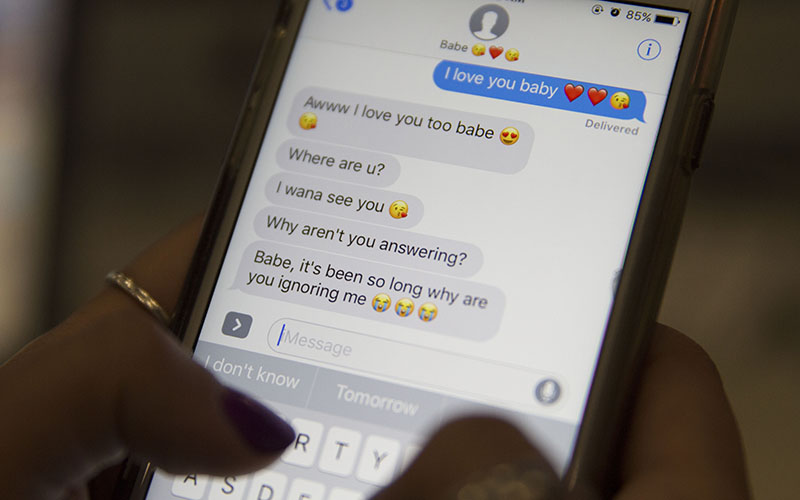
In a Pew Research Center survey, 11 percent of the teens survey indicated they expect to hear from their boyfriend or girlfriend hourly. (Photo by Megan Bridgeman/Cronkite News)
PHOENIX – What would you do if your boyfriend asked you for your cellphone password so he could check your phone?
Or if your girlfriend expected you to text her every hour?
And how would you react if that same person broke up with you through a text?
Experts say teens find themselves in these situations – all of which they consider unhealthy – too often. Studies show technology has changed the way many adolescents “meet, date and break up” with one another.
Phoenix officials have recognized the problems associated with these new ways to communicate, and they have developed programs to better reach out to adolescents to talk to them about dating violence and healthy relationships.
Over the past four years, Phoenix has held about 35 resource fairs and has teamed up with more than 10 agencies on high school campuses. They say they’ve had such a good response, they plan to expand the program to Phoenix, Glendale, Tolleson, Paradise Valley and Deer Valley high school districts in October.

Tamra Ingersoll, a spokewoman for Phoenix, and Sergio Gomez, a strategic initiatives coordinator, say they have found success teaching teens about healthy relationships. (Photo by Alexis Berdine/Cronkite News)
“This year more than ever, we’ve seen a lot of the students come forward to their teachers, to their social workers, to their counselors when they’re recognizing that they’re in a relationship that’s not healthy and have looked to get some type of assistance,” said Sergio Gomez, a strategic initiatives coordinator for the city.
Gomez said some students will come in and say their girlfriend or boyfriend wants the password to their cellphone.
“We try to explain to them well that’s technically not healthy,” he said. “They’re wanting to be controlling over you. There should be that trust in that relationship and those types of issues.”
In a national survey, 13 percent of teens with dating experience who responded said that a partner had demanded that they share their passwords to email and internet accounts with them, according to a Pew Research Center report released in 2015.
Part of the Phoenix program involves hands-on activities that push students to put themselves in the shoes of someone in an unhealthy relationship. The exercise emphasizes how youth do not typically communicate verbally, instead texting through cellphones and social media, Gomez said.
“It’s all through text and how those mixed messages can come up, and so we talk about … how to actually interact and communicate with their significant others in a positive way, you know, and have that respect for each other,” Gomez said. “That’s what’s important in those relationships.”
The Pew report, which surveyed about 1,000 teens ages 13 to 17, included some questionable behavior, including:
-
– Ten percent admitted to modifying or deleting a partner’s social media profile.
-
– Ten percent had impersonated a boyfriend, girlfriend or ex in a message.
-
– Eight percent had sent embarrassing pictures of a partner to someone else.
-
– Four percent had downloaded a GPS or tracking program to a partner’s device without their knowledge.
City officials plan to build on the program and spread out to different school districts, including more high schools and middle schools and some community colleges. In addition, they plan to host about seven resource fairs in October, Gomez said.
“A lot of the time, students are not coming forward to ask for help in their relationships,” Gomez said. “In fact, about 33 percent of students nationwide who are in an unhealthy relationship do not seek help, and that is why addressing this issue is so important.”
The city has made fighting domestic violence a priority for years, and part of its campaign includes Paint Phoenix Purple, which uses the color to raise awareness about domestic violence.
“Sometimes students don’t understand what dating violence is,” said Craig Pletenik, a spokesman for the Phoenix Union High School District. “And particularly if they come from household where there is domestic violence themselves many times, it will perpetuate into the next generation.”